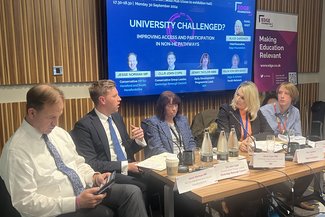Party time
At the Labour Party Conference in Liverpool, Skills Minister Jacqui Smith’s experience shone through. She has clearly been in listening mode these last few weeks (including meeting with Edge) and demonstrated her grasp of the issues in skills policy, covering off tricky questions relating to FE teacher pay, the pause and review of BTEC defunding, English and Maths resits and connecting national and localised skills strategies. Pre-Budget, the detail in some answers was light, though the Prime Minister’s Conference pledge to “rebalance funding in our training system back to young people”, starting with Foundation Apprenticeships in the Growth and Skills Levy, is a big win for the DfE with Treasury, and welcomed by Edge.
Perhaps more encouraging, was the frequency of discussion about the importance of a skills strategy – one that creates more, high-quality opportunities for young people and develops their work-readiness skills – to the productivity agenda, coming from Ministers and MPs outside the Department for Education, business leaders and commentators at events beyond the Skills Hub. Conversations in the Cultural and Creative Industries Pavilion often circled back to how we can support for the next generation of talent in these valuable industries, while financiers called for better education around money management and mentorship to help break down barriers for young entrepreneurs in the main ACC.

On the fringes of the Conservative leadership race in Birmingham, the mood was buoyant. Perhaps due to the interregnum, the views expressed by MPs, former MPs and candidates on education and skills policy felt – on the whole – more honest, unconstrained and wide-ranging, making for interesting panel sessions and audience Q&As. Also needed: a big shout-out to the ICC catering team at Conservative Party Conference for the supply of excellent coffee at the back of the Executive Rooms.
University Challenged
For us at Edge, it is always really refreshing to hear new, different perspectives on why parity of esteem between technical and academic pathways is so important, and how we continue to build that. This really came to the fore in the remarks from the expert panellists at our events at Labour and Conservative Party Conferences, ‘University Challenged? Improving Access and Participation in non-HE pathways’. Across both conferences, our panellists were united in wanting to end the culture wars that often pit university degrees against other pathways, instead placing young people – the choice, advice and opportunities available to them – front and centre of policy decision-making.

At Conservatives, Jesse Norman MP called for a “diverse ecology of provision” and argued “we should abolish the distinction between academic and vocational because we’re already blending them”, citing the exemplar New Model Institute for Technology and Engineering in his constituency of Herefordshire.
In Liverpool, Lucia Quadrini from Edge and Ashoka’s Youth Network noted we still have a way to go to destigmatise non-HE routes for young people, but in doing so, we mustn’t reverse the progress in widening access and participation to HE. Adam Thompson MP drew on his experience teaching mechanical engineering degree apprenticeships, noting the best thing about his job was seeing people take part in further education who wouldn’t have otherwise gone to university.

Any notable absences across the conferences (policies, people, messages)
Policy solutions (and commitments). Particularly frustrating when it comes to those issues that have been rattling around Conference fringe events for many years, listening to some MP’s remarks, it would appear we still haven’t ‘cracked’ challenges like boosting the supply of high-quality work experience placements in rural and coastal areas; support for the third of young people who fail to secure Level 2 English and maths, and parity of esteem between technical and academic pathways. Multiple factors at play, here: tight-lipped MPs not wanting to bind their party to a position or pre-empt Conference speeches/Budget announcements, and the defence of not having been in power for 12 weeks (though, we were left wanting at Conservatives at times, too).
There are answers out there. For those of us in research, policy and practice, there’s lots more work to be done!

